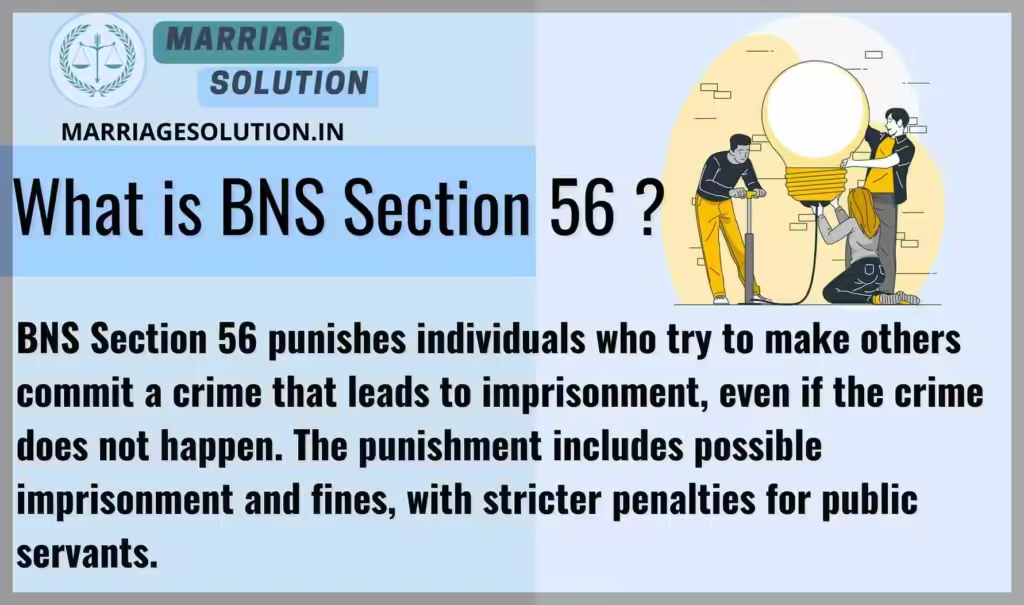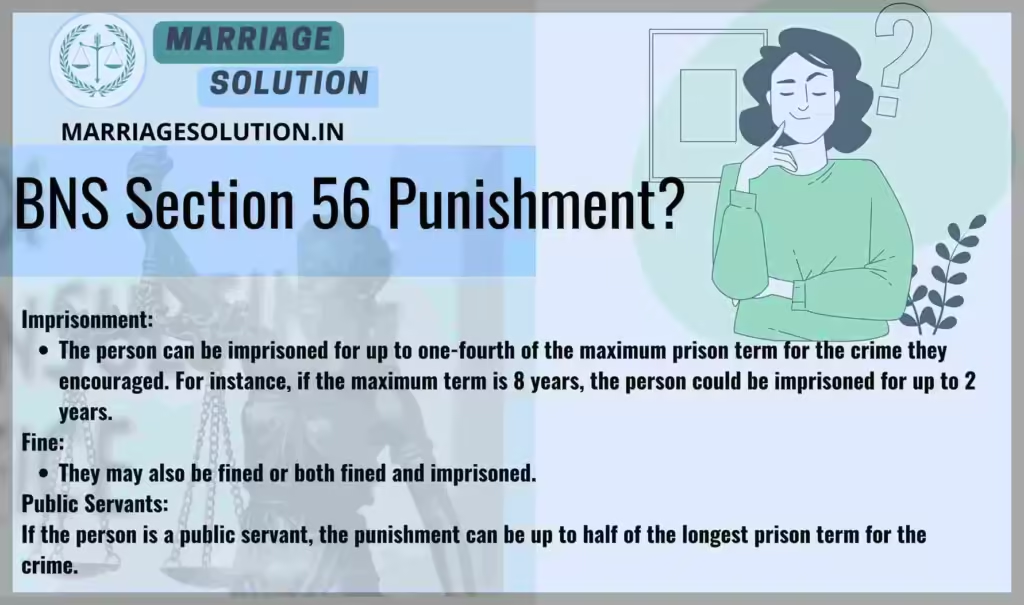Introduction of BNS Section 56
BNS Section 56 is about punishing someone who helps or encourages another person to commit a crime. If the crime does not happen, the person who helped can still be punished. The punishment can be up to one-fourth of the longest prison term for the crime.
The Bharatiya Nyaya Sanhita (BNS) Section 56 replaces the old Indian Penal Code (IPC) Section 116.
What is section 56 of BNS ?
BNS Section 56 punishes individuals who try to make others commit a crime that leads to imprisonment, even if the crime does not happen. The punishment includes possible imprisonment and fines, with stricter penalties for public servants.

BNS Section 56 in Simple Points
If a person encourages, helps, or instigates someone to commit a crime that can lead to imprisonment, but the crime is not actually done, that person can still be punished.
- Normal case → punishment up to one-fourth of the maximum jail term for that crime, or fine, or both.
- If the abettor is a public servant who should have stopped the crime, punishment can go up to one-half of the maximum jail term, or fine, or both.
1. What this means
- Even if the actual crime is not committed, the encouragement to commit crime is punishable.
- The law focuses on criminal intention as well as action.
2. Conditions for this Section
- There must be abetment (instigating, helping, advising, or encouraging).
- The offence must be one that is punishable with imprisonment.
- The offence is not committed in reality.
3. Punishment
- Normal person: Jail up to ¼ of the maximum term of the main offence.
- Public servant: Jail up to ½ of the maximum term of the main offence.
- Fine may also be added in both cases.
4. Nature of Case
- It follows the same rules (bailable or non-bailable, cognizable or not) as the main offence that was attempted to be abetted.
- The trial will also happen in the same court where the main offence would have been tried.
5. Examples
- A tells B to steal a wallet. B does not steal. A is still punishable.
- A police officer encourages a gang to commit robbery, but they do not. The officer can be punished up to half of the maximum jail term for robbery.
- A businessman advises B to cheat in a deal, but B doesn’t act. A can be punished under this section.
6. Why it is important
- Stops people from escaping by saying “crime never happened.”
- Keeps public servants responsible because they are supposed to stop crime, not support it.
- Focuses on criminal mindset and ensures society is protected from people who plan crimes.
- This provision has replaced IPC Section 116 with clearer wording.
Section 56 BNS Overview
BNS Section 56 deals with the punishment for someone who encourages or helps another person commit a crime that is punishable by imprisonment. Even if the crime does not actually happen, the person who encouraged or helped can still be punished. The punishment can be up to one-fourth of the longest prison term for that crime. If the person who helped is a public servant, the punishment can be up to half of the longest prison term.
Key Points:
- Encouragement of Crime:
- If you help or encourage someone to commit a crime punishable by imprisonment, you can be punished even if the crime is not carried out.
- Punishment Length:
- The maximum punishment for encouraging a crime is up to one-fourth of the longest possible prison term for that crime.
- Public Servants:
- If the person encouraging the crime is a public servant (like a police officer), the punishment can be up to half of the longest prison term for the crime.
- Fines:
- In addition to imprisonment, you may also have to pay a fine if you are convicted under this section.
- Imprisonment or Fine:
- The punishment can be imprisonment, a fine, or both, depending on the case.
- No Crime Committed:
- Even if the encouraged crime does not happen, you are still punishable.
- Non-Compounding:
- The offence is non-compoundable, meaning it cannot be settled outside the court.
- Cognizable or Non-Cognizable:
- The crime you encouraged can be either serious (cognizable) or less serious (non-cognizable), affecting how it is handled by the police.
- Legal Process:
- The case will be tried by the court that deals with the crime you encouraged.
- Different Types of Crimes:
- The section applies to various crimes, whether they are serious or less serious, as long as they are punishable by imprisonment.
BNS 56 Punishment
Imprisonment:
- The person can be imprisoned for up to one-fourth of the maximum prison term for the crime they encouraged. For instance, if the maximum term is 8 years, the person could be imprisoned for up to 2 years.
Fine:
- They may also be fined or both fined and imprisoned.
Public Servants:
- If the person is a public servant, the punishment can be up to half of the longest prison term for the crime.

BNS 56 bailable or not ?
If the original offence is bailable, then the abetment offence under Section 56 is also bailable.
If the original offence is non-bailable, then the abetment offence is also non-bailable.
Comparison: BNS Section 56 vs IPC Section 116
| Section | Offence | Punishment | Bailable / Non-Bailable | Cognizable / Non-Cognizable | Trial By |
|---|---|---|---|---|---|
| BNS Section 56 | Abetment of an offence punishable with imprisonment, even if the offence is not carried out. Stricter penalty applies if the abettor is a public servant whose duty is to prevent the crime. |
|
Same as the offence abetted (bailable if the main offence is bailable, otherwise non-bailable). | Same as the offence abetted (cognizable or non-cognizable depending on the main crime). | Tried by the same court that would hear the original offence. |
| IPC Section 116 (Old) | Abetment of an offence punishable with imprisonment, where the offence is not committed in consequence of the abetment. Similar scope as BNS Section 56 but under IPC wording. |
|
Depends on the offence abetted (same approach as BNS). | Follows the classification of the abetted offence under IPC. | Tried by the court that had jurisdiction over the abetted offence. |
BNS Section 56 FAQs
What does BNS Section 56 cover?
It deals with punishing those who encourage or help others to commit crimes that are punishable by imprisonment, even if the crime does not actually occur.
What is the maximum punishment for abetment under this section?
The maximum punishment is up to one-fourth of the longest prison term for the crime. If the abettor is a public servant, it can be up to half of the longest term.
Can a public servant face more severe punishment?
Yes, public servants can be punished with up to half of the longest term of imprisonment for the crime they abetted.
Is a fine also a possible punishment?
Yes, fines can be imposed along with imprisonment.
Conclusion
BNS Section 56 highlights that abetment of a crime is itself a punishable act, even if the offence is never committed. By holding both individuals and public servants accountable, this law ensures that criminal intent is not ignored. It strengthens the justice system by focusing on prevention and responsibility, making society safer against planned crimes.
Need Legal Support?
If you are dealing with court cases, marriage problems, or any other legal issue, our team at Marriage Solution – Lawyer Help is here for you. Simply fill out our quick online enquiry form, and we’ll connect you with the right legal expert to support your needs.
Finished with BNS 56 ? Continue exploring the next provisions of the Bharatiya Nyaya Sanhita (BNS), 2023. Each section includes explanations, examples, and plain-language breakdowns for easy understanding.
- BNS 57 : Abetting commission of offence by the public or by more than ten persons.
- https://marriagesolution.in/bns_section/bns-section-57/
- BNS 58 : Concealing design to commit offence punishable with death or imprisonment for life.
- https://marriagesolution.in/bns_section/bns-section-58/
- BNS 59 : Public servant concealing design to commit offence which it is his duty to prevent .
- https://marriagesolution.in/bns_section/section-59-bns/
- BNS 60 : Concealing design to commit offence punishable with imprisonment .
- https://marriagesolution.in/bns_section/section-60-bns/
- BNS 61 : Criminal conspiracy.
- https://marriagesolution.in/bns_section/bns-section-61/
Full IPC Section List: https://marriagesolution.in/ipc-section-list
All Indian Law & Blogs: https://marriagesolution.in/indian-law/
Full BNSS Section List: https://marriagesolution.in/bnss_section-list
